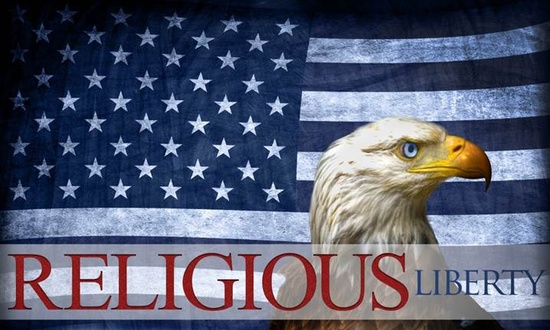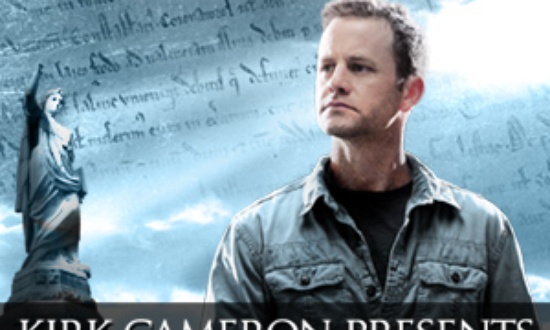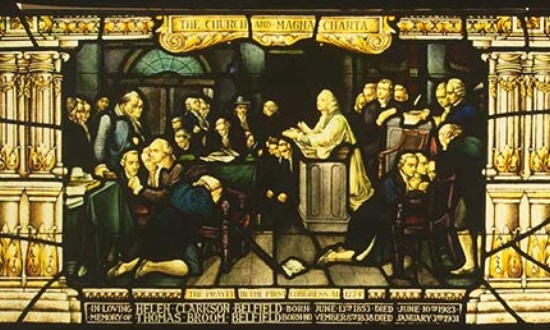I have compiled these original quotes from several secondary sources, including George Grant's Trial and Error. Most of these quotes are cited by David Barton of WallBuilders (P.O. Box 397, Aledo, TX, 76008). I highly recommend his video presentation "America's Godly Heritage," where the contexts for some of these citations are explained. His book The Myth of Separation deals with the historical facts of the intended relationship between the state and the Christian religion. It includes most of these quotes and many more, referencing the original documents from which they are derived. Another comprehensive source, and well documented, is William Federer's America's God and Country. (David Barton has stated that eight quotations originally cited in his books were incorrect or otherwise not documentable—as of 3/28/97 I have removed the two of those quotations I had orginally included in this article.)
It's important to clarify that the purpose of these quotations is not to prove that the Founding Fathers were evangelical Christians, or that they were all models of moral Christian behavior. Some were deists, not Christians, and some were not consistently Christian in their beliefs.
The point is to demonstrate that many of them had a profound faith in God, some of them were followers of Christ, and some envisioned America as a Christian nation. Of course, it was a nation tolerant of other religious beliefs.
Unfortunately there is a growing trend today to tolerate all beliefs except those that are Christian. I think these citations demonstrate the historical inconsistency of this position.
America's Founders and Presidents Speak for Themselves
The highest glory of the American Revolution was this: that it connected in one indissoluble bond civil government with the principles of Christianity. John Quincy Adams
The moral principles and precepts contained in the Scriptures ought to form the basis of all our civil constitutions and laws. All the miseries and evils which men suffer from vice, crime, ambition, injustice, oppression, slavery, and war, proceed from their despising or neglecting the precepts contained in the Bible. Noah Webster
We have staked the future of government not upon the power of government, far from it. We have staked the future of all of our political institutions on the capacity of each and all of us to govern ourselves according to the ten commandments of God. James Madison (primary architect of the Constitution)
I have lived, Sir, a long time, and the longer I live, the more convincing proofs I see of this truth: "that God governs in the affairs of man." And if a sparrow cannot fall to the ground without His notice, is it probable that an empire can rise without His aid?
We have been assured, Sir, in the Sacred Writings that except the Lord build the house, they labor in vain that build it. I firmly believe this. I also believe that without His concurring aid, we shall succeed in the political building no better than the builders of Babel; we shall be divided by our little, partial local interests; our projects will be confounded; and we ourselves shall become a reproach and a byword down to future ages. And what is worse, mankind may hereafter from this unfortunate instance, despair of establishing government by human wisdom and leave it to chance, war or conquest.
I therefore beg leave to move that, henceforth, prayers imploring the assistance of Heaven and its blessing on our deliberation be held in this assembly every morning before we proceed to business. Benjamin Franklin, at the Constitutional Convention
No people can be bound to acknowledge and adore the invisible hand which conducts the affairs of men more than the people of the United States. Every step by which they have advanced to the character of an independent nation seems to have been distinguished by some token of providential agency . . . We ought to be no less persuaded that the propitious smiles of Heaven can never be expected on a nation that disregards the eternal rules of order and right, which Heaven itself has ordained. George Washington, Inaugural Address
(Historical note to above: Washington added the pledge, "So help me God," to his inaugural oath. He then kissed the Bible to affirm his submission to the King of Kings.)
Of all the dispositions and habits which lead to political prosperity, religion and morality are indispensable supports. And let us with caution indulge the supposition that morality can be maintained without religion. . . . Reason and experience both forbid us to expect that national morality can prevail in exclusion of religious principle. George Washington, Farewell Address
Our Constitution was made only for a moral and religious people. So great is my veneration of the Bible that the earlier my children begin to read it, the more confident will be my hope that they will prove useful citizens of their country and respectful members of society. John Adams
The Bible is the best gift God has ever given to man . . . But for it we could not know right from wrong. Abraham Lincoln
It is the duty of nations, as well as of men, to own their dependence upon the overruling power of God and to recognize the sublime truth announced in the Holy Scriptures and proven by all history, that those nations only are blessed whose God is the Lord. Abraham Lincoln
The Bible is the rock on which our Republic rests. Andrew Jackson
Hold fast to the Bible as the sheetanchor of your liberties; write its precepts in your hearts and practice them in your lives. To the influence of this book we are indebted for all the progress made in true civilization and to this we must look as our guide in the future. Ulysses S. Grant
Everyone serving in public office must affirm this statement: "I do profess faith in God the Father and in the Lord Jesus Christ His only Son, and in the Holy Ghost, one God, blessed forever more, and I do acknowledge the Holy Scriptures of the Old and New Testament to be given by divine inspiration." Delaware Constitution
And each member [of the legislature], before he takes his seat, shall make and subscribe the following declaration, viz: "I do believe in one God, the Creator and Governor of the universe, the rewarder of the good and the punisher of the wicked, and I do acknowledge the Scriptures of the Old and New Testament to be given by Divine Inspiration." Pennsylvania Constitution
(Historical note: North Carolina, Maryland and other states had requirements very similar to the above.)
All persons elected to office must make the following declaration: "I do declare that I believe the Christian religion, and have firm persuasion of its truth." Massachusetts Constitution
No person who denies the being of God, or a future state of rewards and punishments, shall hold any office in the civil department of this State. Tennessee Constitution, adopted in 1796
(Historical note: The original state constitutions were adopted before or about the time of the U.S. Constitution. Fiercely independent, the states would never have approved a national constitution that violated their own. Obviously, their concept of the proper relationship between the Christian faith and government was profoundly different than ours today. Honesty and history demand we see the Constitution and its amendments as they did, not as the ACLU does.)
The U.S. Supreme Court
Providence has given to our people the choice of their rulers, and it is the duty of as well as the privilege and interest of a Christian nation to select and prefer Christians for its rulers. John Jay, first Chief Justice of the U.S. Supreme Court
(Historical note to above: Chief Justice Jay was also one of three main contributors to the U.S. Constitution.)
By our form of government the Christian Religion is the established Religion, and all sects and denominations of Christians are set on the same equal footing. U.S. Supreme Court, 1796
Whatever strikes at the root of Christianity tends manifestly to the dissolution of civil government. U.S. Supreme Court, 1811
(Historical note: in the preceding case the Court upheld a $500 fine and three month jail sentence against a man who had continuously blasphemed against Christ. The offense against Christ was regarded as an offense against the nation.)
The purest principles of morality are to be taught. Where are they found? Whoever searches for them must go to the source from which a Christian man derives his faiththe Bible. U.S. Supreme Court, 1844
(Historical note: The above was the Court's response to a Philadelphia school's desire to teach morality without appealing to the Scriptures. The Court's decision required schools to continue using the Bible in the classroom to uphold Christian morality.)
Our law and our institutions must necessarily be based upon and embody the teachings of the Redeemer of mankind . . . it is impossible that it should be otherwise and in this sense and to this extent our civilization and our institutions are emphatically Christian. U.S. Supreme Court, 1892
(Historical note: The court cited 87 legal precedents showing the Christian faith was at the heart of the United States, and the country did not and could not exist independently of it.)
At the time of the adoption of the Constitution and the amendments the universal sentiment was that Christianity should be encouraged, not any one sect. . . . There can be no substitute for Christianity . . . that was the religion of the founders of the republic, and they expected it to remain the religion of their descendants. The great, vital and conservative element in our system is the belief of our people in the pure doctrines and divine truths of the gospel of Jesus Christ. The U.S. House Judiciary Committee Report, 1853
(Historical note: the above was in response to a petition to separate the religion of Christianity from the ongoings of the U.S. government. The petition was denied.)
"The Separation of Church and State"
From its inception, the United States of America recognized the vital role of the God of the Bible in creating and sustaining this country. The Declaration of Independence says that human rights come from our "Creator." It refers to God as the "Supreme Judge of the world." It speaks of the "protection of Divine providence."
Whatever was intended by the Constitution and its amendments had to be in harmony with the many quotes cited from the founding fathers, for they were the ones who wrote and approved that Constitution. To them the idea of keeping Christian beliefs and principles separate from this country's life and policies would have been both absurd and outrageous. (Reread these quotes and decide for yourself if that is true.)
The phrase "separation of church and state" is not found in the Constitution or in any other governing document of this country. The first amendment's prohibition of the government's establishing a religion was clearly intended to guard freedom of religion by preventing one denomination from being given special advantage by the government, and other denominations being marginalized. This is what had happened with the state church of England, which is why America's colonists had come herefor freedom of religious expression. By not having one denomination control the country, their intention was that the Christian religion as a whole would be the foundation of the moral principles and laws of this country. The intent was not freedom from religion, but freedom for religion.
The forefathers agreed that no denomination should be elevated by the state above another, and worked on the proper wording to express this. One draft stated "Congress shall make no law establishing any particular denomination of religion in preference to another, or prohibiting the free exercise thereof, nor shall the rights of conscience be infringed." In fact, the first amendment was meant to mirror the resolutions of the states, such as Massachusetts and New Hampshire, whose constitutions stated, "And every denomination of Christians . . . shall be equally under the protection of the law; and no subordination of any one sect or denomination to another shall ever be established by law."
The term "separation of church and state" (or "wall of separation between church and state") was first used in a 1802 letter written by Thomas Jefferson. His letter assured a concerned group of Baptists that a certain denomination would not become the national denomination. In other words, he was applying the first amendment as intended. The letter was of no particular importance, and sat in obscurity for well over a century.
In 1962 the phrase "separation of church and state," taken completely out of context, was used by the Supreme Court to justify the prohibition of organized or audible prayer in public schools. (In 1963 the Court likewise removed Bible reading from the schools.) For the first time in its history the Supreme Court failed to cite even a single precedent for this decision. The reason was simply that there was no precedent.
For the first time in the almost two hundred year history of the United States, the Christian faith was stripped out of a public institution. This was done the only way it could be donewithout constitutional or historical basis. Many textbooks had favorably quoted the Scriptures, and many public schools directly studied the Bible. Scripture was a source of spelling words, grammar, and illustrations of moral virtues. Most schools had the ten commandments posted on their walls. By Court decision, none of this would be allowed any longer. The Supreme Court's decisions in 1962 and 1963 flew directly in the face of two hundred years of U.S. history.
In 1963, just after the clear message was sent that God was no longer welcome in the schools, national statistics show the beginning of a dramatic increase in teen sexual activity, teen pregnancy, teen venereal disease, juvenile delinquency, illegal drug use, and violent crimes. In that same year public school SAT scores began to plunge, and continue to do so. (See David Barton, America's Godly Heritage.)
Is the timing of this downward plunge coincidental, or were the founding fathers right in saying that God had blessed this nation, but would curse it if we abandoned our godly heritage?
The Testimony of Government Buildings
In his book Trial and Error, George Grant points out that our nation's historical buildings (which have not yet been remodeled by the ACLU) tell the truth about our heritage:
Even if the voices of those great men were silenced by the subverters of our history, the rocks and stones themselves would cry out. In our public buildings, irrefutable evidence our our country's Christian heritage abounds.
The Ten Commandments hang over the head of the Chief Justice in the Supreme Court; in the House and Senate chambers appear the words, In God We Trust; in the capitol rotunda is the figure of the crucified Christ; carvings on the capitol dome testify to, "The New Testament according to the Lord and Savior Jesus Christ"; the Great Seal of the United States proclaims, "Annuit Coeptis," which means, "God has smiled on our undertaking; under the seal is inscribed the phrase from Lincoln's Gettysburg Address, "This nation under God"; the walls of the Library of Congress are adorned with the words of Psalm 19:1 and Micah 6:8; engraved on the metal cap of the Washington Monument are the words, Praise be to God; and linking the stairwell are numerous Scripture verses that apply the Christian faith to every sphere of life from the family to business, from personal character to government.
The men who built this nation knew what we must know: that America depended upon Christianity for its founding, and that it shall ever depend upon it for its perpetuation.
Final Quotes all Americas should ponder:
A nation of well informed men who have been taught to know the price of the rights which God has given them, cannot be enslaved. Benjamin Franklin
As nations cannot be rewarded or punished in the next world, they must be in this. . . . by an inevitable chain of causes and effects Providence punishes national sins by national calamities. George Mason, at the Constitutional Congress
I tremble for my country when I consider that God is just and his justice cannot sleep forever. Thomas Jefferson
The philosophy of the school room in one generation will be the philosophy of government in the next. Abraham Lincoln
In this actual world, a churchless community, a community where men have abandoned and scoff at, or ignore their Christian duties, is a community on the rapid downgrade. Theodore Roosevelt
A nation which does not remember what it was yesterday, does not know what it is today, nor what it is trying to do. We are trying to do a futile thing if we do not know where we came from or what we have been about. Woodrow Wilson
The church must take right ground in regard to politics. Politics are a part of a religion in a country as this, and Christians must do their duty to the country as part of their duty to God. . . . He will bless or curse this nation according to the course Christians take in politics. Charles Finney
(Historical note: Through studying the verses on which American law was based, Finney the law student became a Christian. He then became one of the greatest revival evangelists in U.S. history. Finney was also an outspoken opponent of slavery, and a defender of the illegal and lifesaving Underground Railroad that brought liberty and justice to slaves.)



